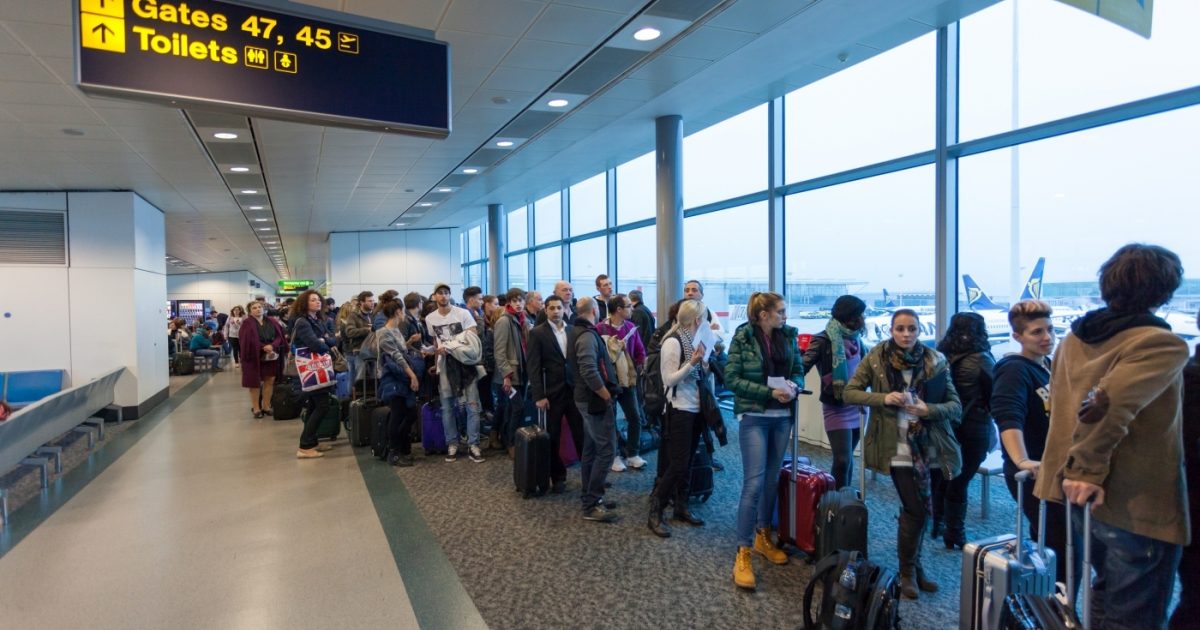We want to raise £20,000 through Big Give to campaign for a frequent flyer levy. To donate, click here
If we’re going to stop climate breakdown, we’ve got very little carbon left in the tank. For any chance of limiting global heating to under 2C (a level which will still lead to profound and widespread climate damage) the UK must emit less than 5,000 mega-tonnes of carbon dioxide and equivalent gases (MtCO2e). This might sound like a lot, but in 2022 alone we pumped around a tenth of that – 450 MtCO2e – into our atmosphere. We’re burning through our carbon budget, and fast.
The question of how the remaining “allowable emissions” get shared out – who gets what piece of the last carbon pie – should be the question of our time. Is it fair, for example, to allow the transport sector to continue to burn fossil fuels, and expect other sectors like farming or electricity to pick up the slack? Right now, these decisions are being made with little public scrutiny, through government inaction or lobbying from industry representatives. What we do know, is that the aviation industry has made a play for a very big chunk of the pie.
Around the country, airports are trying to expand to serve more passengers. When we look into the data, we can see that a large proportion of this growth serves the habits of frequent flyers. And those frequent flyers tend to be the wealthiest people in society. Pre-pandemic, around 20% of individuals in the top fifth of earners flew abroad four or more times in a year. For the poorest fifth, just 3% flew this much (see Figure 1).
Figure 1: A far higher proportion of high earners fly regularly compared to lower earners
As a result, a disproportionate share of aviation’s climate damage comes from a small number of mostly very wealthy individuals. Crude estimates suggest flying in a business-class seat creates between 2.6 and 4.3 times more CO2 per passenger than a similar trip economy class. A typical flight by private jet creates 45 times more emissions. A tiny minority is gobbling up all the carbon pie.
Much to the surprise of the aviation industry, a small step towards tackling this problem appeared in the 2024 spring budget. Seemingly to free up funds for his regressive tax cuts, chancellor Jeremy Hunt increased air passenger duty (APD) on business and first-class tickets. While this doesn’t perfectly target the frequent flyers most responsible for emissions, it does increase taxes on a part of the air travel market which is disproportionately contributing to the climate crisis. Left untouched, however, are a whole range of unnecessary and excessive economy class flights. This includes, for example, flights to destinations in France, Belgium, and the Netherlands easily reachable by train.
Hunt’s APD increase was modest, increasing taxes on long-haul non-economy class flights by about £22 per person by 2026 – but this was enough to enrage the industry. Representatives described the move as “another tax on British businesses” – even though the aviation industry already receives incredibly generous tax arrangements. Exemptions from VAT and fuel duty (net of APD) mean the government gives the industry upwards of £7bn a year.
The reality is that growth in total distance travelled by all UK air passengers needs to stop immediately. Research by Chatham House finds that a responsible approach to the climate crisis would mean cutting passenger kilometres by around a third by 2030– or at least until the industry has proven and rolled out the technologies it claims will allow us to fly with less emissions. Tax rises will play a role in reducing demand for flying and ensuring that aviation actually pays for its damage to our climate. The government’s own aviation strategy implicitly recognises this, but no policies have yet been legislated.
We need urgent action, but it must be carefully considered. Do we want air travel to become the reserve of a wealthy elite, who will be able to afford a higher rate of tax on a ticket? Or do we recognise international travel as a public good, to which everyone has a right? For an equitable, effective approach instead, we need a frequent flyer levy. With a frequent flyer levy, the first round-trip flight you take in a year will be charged low or no departure tax. Every subsequent flight is charged an increasing rate.
When it comes to cutting carbon emissions, many of the easy carbon savings are now in the bank. The next general election must produce a government willing to take on the more complex climate-saving goals with assertive and fair climate action. But they’ll need to move quickly, for the rich are already devouring the last of the carbon pie.
We want to win a frequent flyer levy. Help us raise £20,000 with Big Give to achieve this.
Image: iStock


